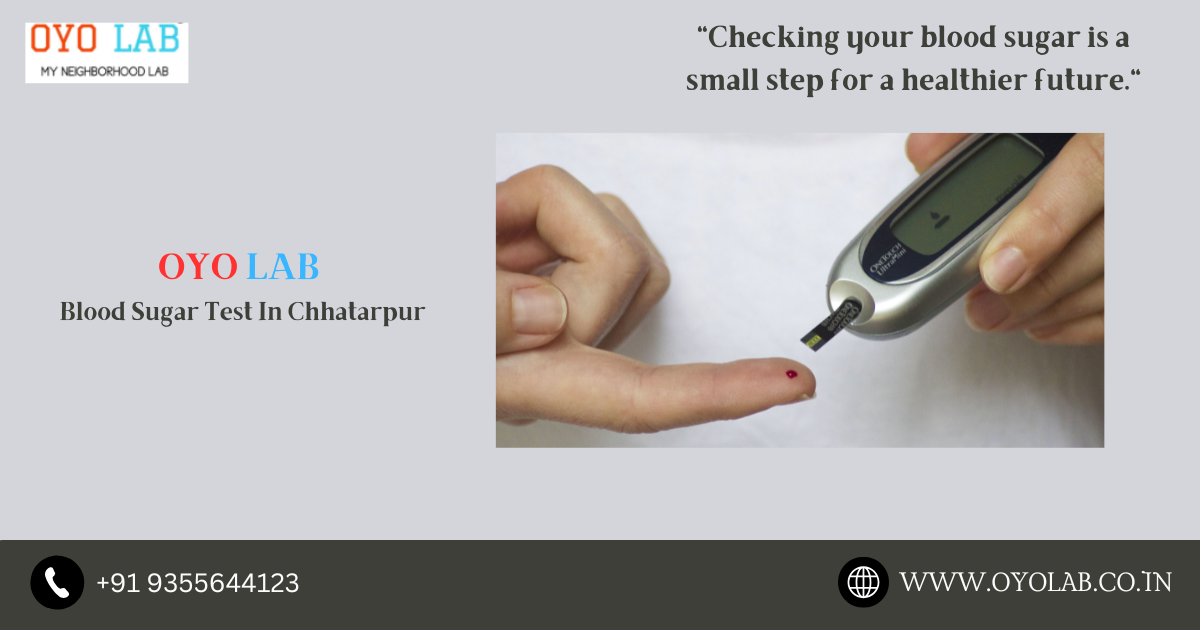
Blood Sugar Test In Chhatarpur
By Shilpa | March 05, 2025
What Is Blood Sugar Test ?
A Blood Sugar Test measures the amount of glucose (sugar) in your blood. It is commonly used to diagnose and monitor diabetes and other conditions that affect blood sugar levels. The test can be done using a blood sample taken from a vein (lab test) or a fingerstick test using a glucometer.
Types of Blood Sugar Tests:
- Fasting Blood Sugar (FBS) – Measures blood sugar after fasting for at least 8 hours.
- Random Blood Sugar (RBS) – Measures blood sugar at any time of the day, regardless of food intake.
- Oral Glucose Tolerance Test (OGTT) – Measures blood sugar before and after drinking a sugary solution.
- Hemoglobin A1C (HbA1c) – Shows average blood sugar levels over the past 2-3 months.
- Postprandial Blood Sugar (PPBS) – Measures blood sugar 2 hours after eating.
Why is it Done?
- To diagnose diabetes or prediabetes.
- To monitor diabetes management.
- To check for hypoglycemia (low blood sugar) or hyperglycemia (high blood sugar).
- To assess how medications, diet, and lifestyle changes affect blood sugar levels.
Importance Of Blood Sugar Test ?
A blood sugar test is crucial for maintaining overall health, especially for individuals with diabetes or those at risk of developing it. Here’s why it matters:
1. Early Detection of Diabetes
- Helps diagnose diabetes and prediabetes before serious complications arise.
- Identifies abnormal blood sugar levels, allowing early intervention through diet, exercise, or medication.
2. Monitoring Diabetes Management
- Ensures that blood sugar levels remain within a healthy range.
- Helps adjust medications, insulin, and lifestyle changes based on results.
- Prevents both high blood sugar (hyperglycemia) and low blood sugar (hypoglycemia), which can be dangerous.
3. Preventing Long-Term Complications
- High blood sugar over time can cause heart disease, kidney damage, nerve damage, vision loss, and stroke.
- Regular monitoring helps prevent these complications by keeping glucose levels in check.
4. Checking Effectiveness of Treatment
- Helps assess whether medications, insulin, or lifestyle changes (such as diet and exercise) are working.
- Enables doctors to make necessary adjustments to improve diabetes control.
5. Essential for People at Risk
- Beneficial for those with risk factors like obesity, family history of diabetes, high blood pressure, or sedentary lifestyle.
- Can help people take preventive measures before developing full-blown diabetes.
6. Helps in Managing Gestational Diabetes
- Pregnant women with gestational diabetes need regular monitoring to avoid complications for both mother and baby.
7. Useful for Non-Diabetics
- Helps detect issues like hypoglycemia (low blood sugar), which can cause dizziness, fatigue, and fainting.
- Can be useful for athletes or individuals on strict diets to ensure balanced glucose levels.
Benefits Of Blood Sugar Test ?
Regular blood sugar testing offers several advantages, whether you have diabetes, are at risk, or simply want to maintain overall health.
1. Helps in Early Detection of Diabetes
- Identifies prediabetes or diabetes before symptoms appear.
- Allows for early intervention with lifestyle changes or medications.
2. Aids in Effective Diabetes Management
- Helps individuals with type 1, type 2, or gestational diabetes maintain stable blood sugar levels.
- Allows for adjustments in medication, insulin, diet, and exercise based on test results.
3. Prevents Serious Health Complications
- High blood sugar levels over time can lead to heart disease, kidney failure, nerve damage, vision loss, and stroke.
- Regular monitoring reduces the risk of these complications.
4. Avoids Hypoglycemia & Hyperglycemia
- Prevents dangerously low blood sugar (hypoglycemia), which can cause dizziness, confusion, and fainting.
- Helps manage high blood sugar (hyperglycemia), which can lead to long-term damage.
5. Provides Insight into Dietary & Lifestyle Effects
- Helps understand how different foods, physical activity, and stress affect blood sugar.
- Encourages healthier lifestyle choices to maintain stable glucose levels.
6. Assists in Adjusting Medications & Insulin
- Ensures medications and insulin doses are working effectively.
- Helps doctors make timely adjustments to treatment plans.
7. Supports a Healthy Pregnancy
- Essential for managing gestational diabetes and ensuring the health of both mother and baby.
- Prevents complications such as premature birth or excessive birth weight.
8. Improves Overall Well-Being
- Reduces the risk of fatigue, frequent urination, excessive thirst, and mood swings caused by unstable blood sugar.
- Promotes better energy levels and mental clarity.